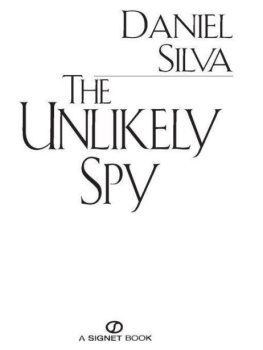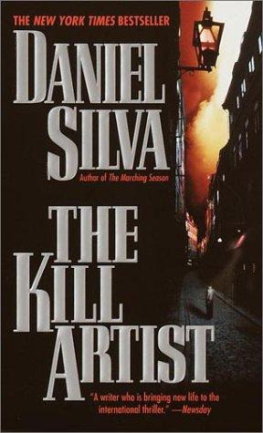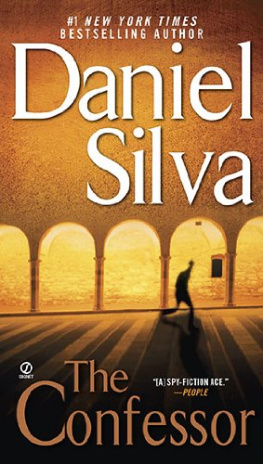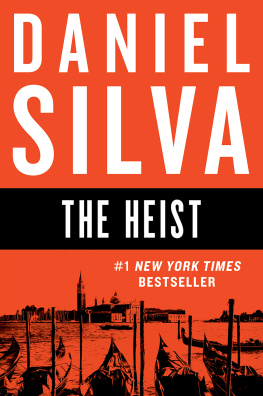THE SECRET SERVANT
ALSO BY DANIEL SILVA
The Messenger
Prince of Fire
A Death in Vienna
The Confessor
The English Assassin
The Kill Artist
The Marching Season
The Mark of the Assassin
The Unlikely Spy
THE S ECRET S ERVANT
DANIEL SILVA
G. P. PUTNAMS SONS
NEW YORK
2007
G. P. PUTNAMS SONS
Publishers Since 1838
Published by the Penguin Group
Penguin Group (USA) Inc., 375 Hudson Street, New York, New York 10014, USA Penguin Group (Canada), 90 Eglinton Avenue East, Suite 700, Toronto, Ontario M4P 2Y3, Canada (a division of Pearson Penguin Canada Inc.) Penguin Books Ltd, 80 Strand, London WC2R 0RL, England Penguin Ireland, 25 St Stephens Green, Dublin 2, Ireland (a division of Penguin Books Ltd) Penguin Group (Australia), 250 Camberwell Road, Camberwell, Victoria 3124, Australia (a division of Pearson Australia Group Pty Ltd) Penguin Books India Pvt Ltd, 11 Community Centre, Panchsheel Park, New Delhi110 017, India Penguin Group (NZ), 67 Apollo Drive, Rosedale, North Shore 0745, Auckland, New Zealand (a division of Pearson New Zealand Ltd.) Penguin Books (South Africa) (Pty) Ltd, 24 Sturdee Avenue, Rosebank, Johannesburg 2196, South Africa
Penguin Books Ltd, Registered Offices: 80 Strand, London WC2R 0RL, England
Copyright 2007 by Daniel Silva
All rights reserved. No part of this book may be reproduced, scanned, or distributed in any printed or electronic form without permission. Please do not participate in or encourage piracy of copyrighted materials in violation of the authors rights. Purchase only authorized editions.
Library of Congress Cataloging-in-Publication Data
Silva, Daniel, date.
The secret servant / Daniel Silva.
p. cm.
Sequel to: The messenger.
ISBN: 1-4295-3754-X
1. Allon, Gabriel (Fictitious character)Fiction. 2. Intelligence officersFiction. 3. TerrorismPreventionFiction. 4. IsraelisNetherlandsAmsterdamFiction. I. Title.
PS3619.I5443S43 2007b 2007017548
813'.6dc22
This is a work of fiction. Names, characters, places, and incidents either are the product of the authors imagination or are used fictitiously, and any resemblance to actual persons, living or dead, businesses, companies, events, or locales is entirely coincidental.
While the author has made every effort to provide accurate telephone numbers and Internet addresses at the time of publication, neither the publisher nor the author assumes any responsibility for errors, or for changes that occur after publication. Further, the publisher does not have any control over and does not assume any responsibility for author or third-party websites or their content.
For Stacy and Henry Winkler, for their friendship,
support, and tireless work on behalf of children. And, as
always, for my wife, Jamie, and my children, Lily and
Nicholas.
On present demographic trends, by the end of the twenty-first century at the latest, Europe will be Muslim.
B ERNARD L EWIS
The threat is serious, is growing and will, I believe, be with us for a generation. It is a sustained campaign, not a series of isolated incidents. It aims to wear down our will to resist.
D AME E LIZA M ANNINGHAM -B ULLER,
DIRECTOR GENERAL OF MI5
If you send a prisoner to Jordan, you get a better interrogation. If you send a prisoner, for instance, to Egypt, you will probably never see him again.
R OBERT B AER, AS QUOTED BY
S TEPHEN G REY IN Ghost Plane
THE SECRET SERVANT
Contents
PART O NE DEATH OF A PROPHET
Chapter 1
Chapter 2
Chapter 3
Chapter 4
Chapter 5
Chapter 6
Chapter 7
Chapter 8
Chapter 9
Chapter 10
PART T WO THE LAND OF STRANGERS
Chapter 11
Chapter 12
Chapter 13
Chapter 14
Chapter 15
Chapter 16
Chapter 17
Chapter 18
Chapter 19
Chapter 20
Chapter 21
Chapter 22
Chapter 23
Chapter 24
PART T HREE THE SACRIFICE OF ISAAC
Chapter 25
Chapter 26
Chapter 27
Chapter 28
Chapter 29
Chapter 30
Chapter 31
Chapter 32
Chapter 33
Chapter 34
Chapter 35
Chapter 36
Chapter 37
Chapter 38
Chapter 39
Chapter 40
Chapter 41
Chapter 42
PART F OUR THE BRIDGE OVER JAHANNAM
Chapter 43
Chapter 44
Chapter 45
Chapter 46
Chapter 47
Chapter 48
Chapter 49
Chapter 50
Chapter 51
Chapter 52
Chapter 53
Chapter 54
Chapter 55
Chapter 56
Chapter 57
Chapter 58
Chapter 59
PART F IVE A WEDDING BY THE LAKE
Chapter 60
Chapter 61
Chapter 62
Chapter 63
Chapter 64
A UTHORS N OTE
A CKNOWLEDGMENTS
PART O NE
DEATH OF A PROPHET
A MSTERDAM
I t was Professor Solomon Rosner who sounded the first alarm, though his name would never be linked to the affair except in the secure rooms of a drab office building in downtown Tel Aviv. Gabriel Allon, the legendary but wayward son of Israeli intelligence, would later observe that Rosner was the first asset in the annals of Office history to have proven more useful to them dead than alive. Those who overheard the remark found it uncharacteristically callous but in keeping with the bleak mood that by then had settled over them all.
The backdrop for Rosners demise was not Israel, where violent death occurs all too frequently, but the normally tranquil quarter of Amsterdam known as the Old Side. The date was the first Friday in December, and the weather was more suited to early spring than the last days of autumn. It was a day to engage in what the Dutch so fondly refer to as gezelligheid , the pursuit of small pleasures: an aimless stroll through the flower stalls of the Bloemenmarkt, a lager or two in a good bar in the Rembrandtplein, or, for those so inclined, a bit of fine cannabis in the brown coffeehouses of the Haarlemmerstraat. Leave the fretting and the fighting to the hated Americans, stately old Amsterdam murmured that golden late-autumn afternoon. Today we give thanks for having been born blameless and Dutch.
Solomon Rosner did not share the sentiments of his countrymen, but then he seldom did. Though he earned a living as a professor of sociology at the University of Amsterdam, it was Rosners Center for European Security Studies that occupied the lions share of his time. His legion of detractors saw evidence of deception in the name, for Rosner served not only as the centers director but was its only scholar in residence. Despite those obvious shortcomings, the center had managed to produce a steady stream of authoritative reports and articles detailing the threat posed to the Netherlands by the rise of militant Islam within its borders. Rosners last book, The Islamic Conquest of the West , had argued that Holland was now under a sustained and systematic assault by jihadist Islam. The goal of this assault, he maintained, was to colonize the Netherlands and turn it into a majority Muslim state, where, in the not-too-distant future, Islamic law, or sharia , would reign supreme. The terrorists and the colonizers were two sides of the same coin, he warned, and unless the government took immediate and drastic action, everything the freethinking Dutch held dear would soon be swept away.
The Dutch literary press had been predictably appalled. Hysteria, said one reviewer. Racist claptrap, said another. More than one took pains to note that the views expressed in the book were all the more odious given the fact that Rosners grandparents had been rounded up with a hundred thousand other Dutch Jews and sent off to the gas chambers at Auschwitz. All agreed that what the situation required was not hateful rhetoric like Rosners but tolerance and dialogue. Rosner stood steadfast in the face of the withering criticism, adopting what one commentator described as the posture of a man with his finger wedged firmly in the dike. Tolerance and dialogue by all means, Rosner responded, but not capitulation. We Dutch need to put down our Heinekens and hash pipes and wake up, he snapped during an interview on Dutch television. Otherwise, were going to lose our country.









